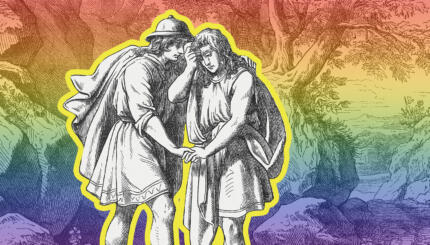Many LGBT Jews and allies find Leviticus to be challenging. Here is one rabbi’s reading of the passage. More can be found here.
Among LGBT Jews and their allies, Leviticus is a dirty word. And not just because of its two famous homophobic verses. There are many challenging issues with Leviticus. For instance, while we support gender equality, Leviticus establishes an all-male system of ritual leadership. While we affirm the equal worth of people with physical disabilities, Leviticus excludes them from the priesthood. And of course, while we celebrate the blessing and beauty in loving same-sex relationships, Leviticus prescribes the death penalty for gay men who have intercourse.
So how do we work with a sacred text that is at odds with some of our deepest values–values that other parts of affirm (like every person being created in God’s image)? For me, it starts with an approach to sacred texts that views them as human-created documents. Consistent with my Reconstructionist philosophy, I view the Torah as a record of our Israelite ancestors’ best efforts to describe their experiences of God and Truth.
The Torah contains tremendous spiritual wisdom as well as the spiritual errors of the people who created it. Seen this way, the Torah takes its place in Jewish religious life as the beginning of an ongoing process of spiritual discussion and discernment–but it does not have the final word on the subjects it addresses. When credible reinterpretations of harmful biblical laws are not possible, we dissent from those verses without abandoning our faith or our intimate relationship to Torah.
This is how I approach the anti-gay verses in Leviticus. I’m not persuaded by the attempts some have made to reinterpret Lev 18:22 and 20:13 to mean something other than what they appear to mean. Rather, I acknowledge my disappointment and anger at the suffering these texts have wrought, and I believe that our ancestors were mistaken on this issue. Similarly, I respond to other passages in the Torah that advocate things that modern liberal Jews openly condemn (such as the passages in Numbers 31 in which God and Moses commanded the genocide of all Midianite men, women, and children).
Yes, this makes me a religious Jew who “picks and chooses.” I believe that we have a moral responsibility to thoughtfully pick and choose, because as human beings we are all morally responsible for any harms we commit in the name of our religions. To quote a teacher of mine, “There is no ‘I was just following orders’ defense that excuses harms people inflict in the name of their religious beliefs.” Part of a thoughtful, liberal religious approach to Judaism is the process of studying our sacred texts, discussing them, and very thoughtfully picking and choosing our present day beliefs and practices in community with each other.
So, why am I writing about Leviticus for Keshet? Well, because, alongside the passages in the book that we are right to reject, Leviticus also contains spiritual riches that can help us in these times. For starters, Leviticus is the source of “love your neighbor (19:12).” Futhermore, Leviticus offers a model of economies and ecosystems operating in a way that ensures health for the land and fairness and compassion for the weakest members of society–quite a contrast to our self-inflicted plagues of greed and ecological degradation. Leviticus also understands that animals and human beings share a common life force, and that the act of taking an animal’s life for meat deserves awe and ritual–compare that with our inhumane and unhealthy factory farm system. And perhaps most remarkably of all: Leviticus calls on each of us to be holy because God is holy. How the ancient Israelite priesthood understood what creates holiness is different than how we understand it. But Leviticus reminds us of the importance of embracing the charge to try to figure out what it means to be holy in the here and now.
Studying Leviticus from a progressive religious Jewish perspective is frustrating and rewarding, alienating and inspiring. But it’s quite worth the workout!
Like this post? Join the conversation through MyJewishLearning’s weekly blogs newsletter.

